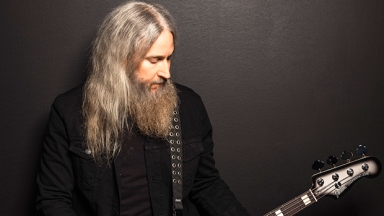
View gallery
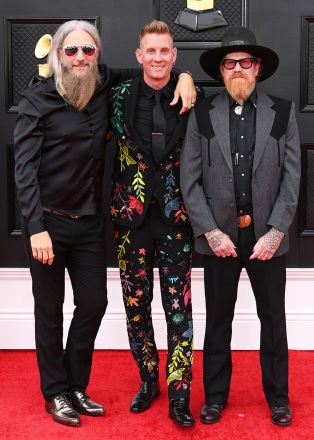
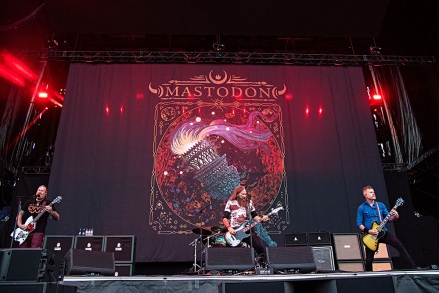
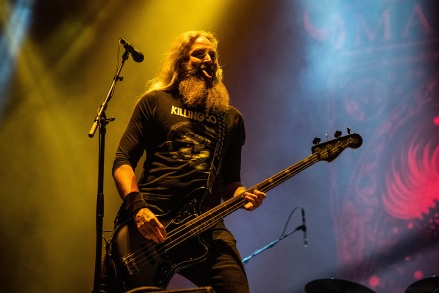
Image Credit: Fender
Troy Sanders tries not to stand out, but at first glance, you wouldn’t know that. He sports a lavish beard worthy of his “Tusk” nickname. Over the past two decades, he’s performed worldwide as vocalist and bassist for Grammy Award-winning metal band Mastodon. Troy has even partnered with Fender guitars to launch the Fender® Troy Sanders Precision Bass®, featuring the dynamic, eye-catching Silverburst finish that has become his signature. And yet, as Troy speaks with HollywoodLife about the new Fender bass and his playing style, he isn’t one to toot his own horn. “I think you need to always know your role,” he tells HL in a straightforward fashion. “In a band, in a relationship, in a business, or whatever — you need to know your role.”
“Within Mastodon, I fully am aware of that, and it hasn’t really changed much over the years because we’re driven with two really incredible guitar players that just write amazing music,” says Troy of Bill Kelliher and Brent Hinds. He then turns his admiration to drummer and singer Brann Dailor. “And we have a drummer who’s just this beast of an octopus behind a drum set with a beautiful voice, so we have a lot going on. It would be a disservice if I tried to show off at the same time.”
A man who doesn’t want to show off, having a Signature Fender Precision Bass with an instantly recognizable color? This apparent contradiction makes sense considering Troy’s approach to the instrument and his history with Fender — precisely the Silverburst finish. “In the formative years, Bill and Brent, our two Mastodon guitar players, each had Silverbursts,” he explains. “I stood in the middle, and I only owned one bass guitar at the time. It was a natural finish Fender Prophecy. That was my only bass. I couldn’t afford a second one. So, we traveled the country for five years before I was ever able to purchase a second backup bass guitar. For those first handfuls of years, they’re like, ‘Dude, you got to get a Silverburst so we can all match on stage,’ strictly for aesthetic purposes.”
In an ironic twist, Troy stood out between Bill and Brent by not having a colorful guitar. “It took me many, many years later before I could ever [get one],” he says. “I don’t remember what year I finally bought a Silverburst one, but by then, my guitar players were able to afford multiple guitars,” he says, “so we never really matched it all up. But the intention was solid from day one.”
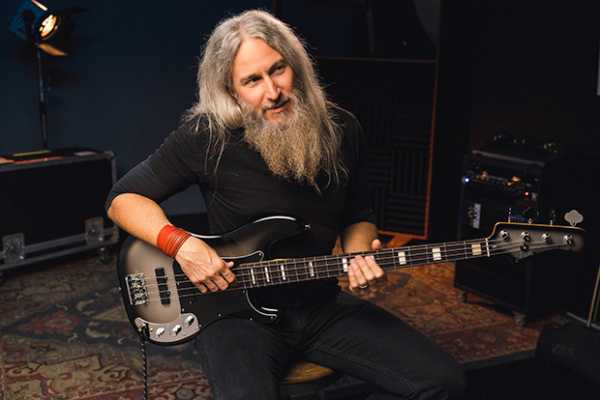
(Fender)
“But ever since, I’ve been on a Silverburst kick because of those guys,” says Troy with a smile. “I wound up buying a pickup truck that I owned for 15 years, and it was silver with all black, so it was a Silverburst. And wardrobe-wise, I tend to wear gray Levi’s and black shirts. Simple, nothing flashy. So, the Silverburst guitar idea from 2001 has really permeated all various facets of my life with what I drive and what I wear, so it’s become a part of me, I guess.”
The Silverburst is not just a piece of Mastodon lore but also a way for Troy to connect to the band’s humble beginnings. Though the group is one of the highest-regarded metal bands of the past twenty years and will begin The Mega-Monsters Tour with Gojira and Lorna Shore in April, there was a time when they were still up-and-comers. The new Troy Sanders Fender Precision Bass design connects to that humble beginning before the critically-acclaimed albums, Grammy wins, and world tours.
“It’s almost like a sports team with a rich history, you know? You can’t mess with your color scheme. So, I’m creating my own,” he says. “Yeah, I love it. It’s a part of me. And again, I don’t fear change, but I get very comfortable with the simple things in life, like colors and clothing and such.”
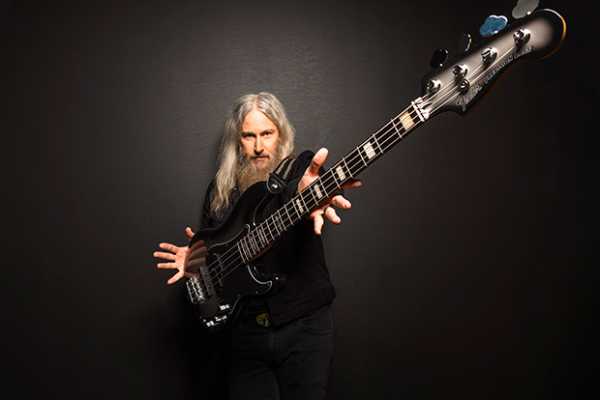
(Fender)
Troy is a man of modest comforts. Look at his “luxurious living” space in this outtake of The Making of Hushed And Grim, the documentary about their 2021 double album. It also can be felt in his playing style. As he states in the documentary about 2017’s Emperor of Sand, his bass “needs to remain grounded in Mastodon,” and that he must be “blended or camouflaged really well” into the song, even going to don camo facepaint and hide in the fauna around his home in Florida.
“Just going back to knowing my role and knowing how it needs to be massaged into the music for the greater good of the song,” he tells HL, “that’s the whole intention, always. There have been times when we write a song together, and it comes time to record, and I go down to start playing the things I’ve been practicing. And so often, from years ago to all the way to this past record, I’ll try something and then go, ‘You know what? That’s cool, but let me try this,’ and it’s always something simpler.”
“Nine out of 10 times,” he says, “it’s the simpler version that fits the song better. And I wasn’t being flashy to start with.” Troy said his first basslines are “just more movement,” which often overwhelms the rest of the composition. “There’s a lot of movement going around already, so if I just simplify and just hold a root note, for example, for 16 [beats], it lets the other pieces shine, and it builds a better song.
“So, my role hasn’t changed much over the ten records or so that we’ve done over the 20 years because, again, it would just be taking a step backward or just doing a disservice to the band if I said, ‘Nope, this is what I’m doing,’ and it was not the best thing to do,” he says. “So yeah, I like to stay camouflaged, and I like to be in the woods alone from time to time, or ham it up for the camera crew. Try to throw on a little charm, as people walking their children to the playground are very suspicious of me, like a big hairy dude in camouflage coming up out of the bush.”
Though Troy downplays his role in the band, Brann pointed out in The Making of Emperor of Sand that his involvement is essential: “Until it’s Troy playing bass, it doesn’t sound like Mastodon.”
Therein lies one of the biggest conundrums of the instrument. It’s vital to fill out a band’s sound, but its low register doesn’t get the spotlight like a blistering guitar solo. And despite being a way to add a robust layer to a group’s sound, bass players are seen as “the loser of the band,” as Kevin McDonald said in a famous Kids In The Hall sketch. “Everyone hates the bass player,” he decried. “Nobody invites the bass player to the party after the show.”
And it does seem that for every virtuoso (Esperanza Spalding, Jaco Pastorius) or trailblazing pioneer (Carol Kaye, Meshell Ndegeocello, Geezer Butler) or icon (Geddy Lee, Les Claypool, Lemmy), there are at least a hundred bass player jokes. Dave Mustaine of Megadeth said in 2008 that “the bass isn’t a difficult instrument to play. It’s one step up from the kazoo, isn’t it?” (h/t Guitar World). Metallica’s 1998 album, …And Justice For All, remains the most infamous example of slight, with then-newcomer Jason Newstead’s bass inaudible in the mix (which is due to either him mirroring James Hetfield’s rhythm guitar parts and getting lost in the mix — or as mixing engineer Steve Thompson claimed in 2015, drummer Lars Ulrich demanding that the bass getting brought down “where you can barely audibly hear it.”)
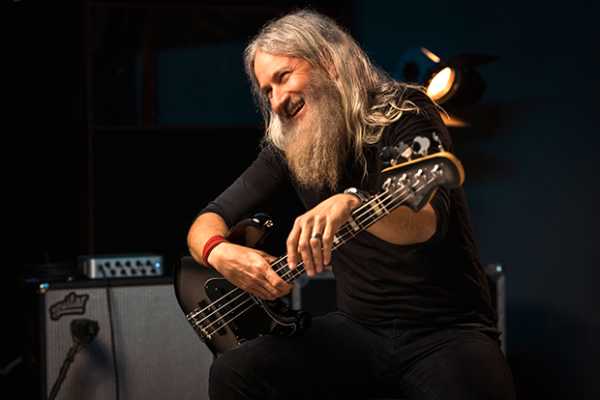
(Fender)
But, it seems that public perception is changing. Thundercat — “the Best Bass player on the Planet,” according to Flea — continues to dazzle audiences with what he can do with the instrument. The late Cliff Burton, the original Metallica bassist, is a sainted figure in metal. Has the instrument’s time finally come?
“I’ve always had a great appreciation for it, obviously, because I’ve been trying to play bass well for a long, long, long time,” Troy Sanders tells HL. Burton “was my main influence at a young age,” says the Mastodon member. “I closed my bedroom door and learned the first three Metallica records, and I’ve always credited that to being my bass lessons. So, I’ve always been a massive fan of Metallica, and still to this day, because of Cliff Burton his ferocity. It just came in, swooped me up, and said, ‘This is what you should do,’ and I said, ‘Yes, I will.’”
“As far as the general public these days with more admiration for bass,” ponders Troy. “I mean, it’s not an expendable piece of the pie when it comes to a rock band. And a lot of times, Mastodon will have band practice, and when I can’t make it, if they feel pretty well-rehearsed, sometimes they won’t want to do it because they don’t want to play the songs without the bass. Which I’m like, ‘That’s awesome.’”
“It’s just a little hint of, ‘sometimes, without the bass, it’s obviously something missing.’ That low end is really what gives the guts to rock and metal,” he adds. “I don’t think if many albums came out today without bass guitar, they wouldn’t hit as hard. It would definitely hit differently. I’ve just never really pictured a rock band without a bass guitar.”
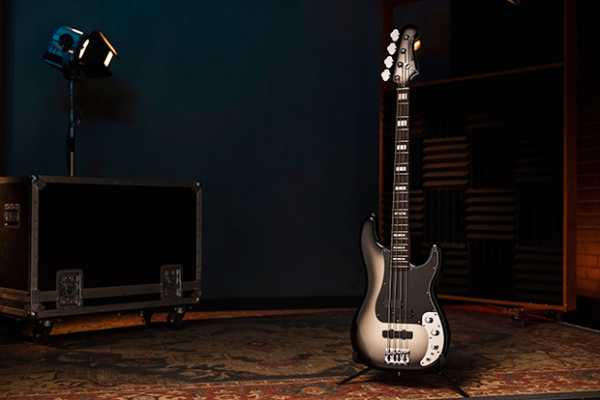
(Fender)
Soon, players can picture themselves holding Troy’s bass just by looking in the mirror. The Fender® Troy Sanders Precision Bass® marks the collaboration between the Mastodon member and the iconic guitar brand. In 2013, Fender launched the Troy Sanders Jaguar Bass and the Squire By Fender Model of the Jaguar Bass. Both the basses from Jaguar and Squire (Fender’s more economical brand) featured the trademark Silverburst finish, the logo from Mastodon’s Remission album on the neck plate, and Troy’s signature on the back of the headstock.
For 2023, Fender and Troy are rolling out a Precision model utilizing the same Silverburst finish, Remission logo on the neck plate, Emperor of Sand icon on the 12th fret, and Troy’s signature decal on the back of the headstock. The P-Bas boasts a maple neck with a custom ’70s P-bass® “C” shape and 9.5″-radius slab rosewood fingerboard with pearloid block inlays and 20 medium jumbo frets. As opposed to Jazz models, Fender’s P-Bass has a thicker neck, more symmetrical waist contour, and “balanced” weight (h/t Sweet Water). Helping capture Troy’s “burly” sound are Tim Shaw-designed split-coil precision bass® and single-coil jazz bass pickups, custom-voiced 18V preamp and Fender HiMass™ vintage bridge.
Troy tells HL that he and Fender started having discussions for a P-Bass shortly after the launch of the Jaguar and Squire models. But, instead of saturating the market with everything all at once, Fender knew that anticipation was the greatest seasoning. With the Squire and Fender models no longer on sale (they’re only available through the secondary market), it seems now is the time to launch this new addition to the Fender family.
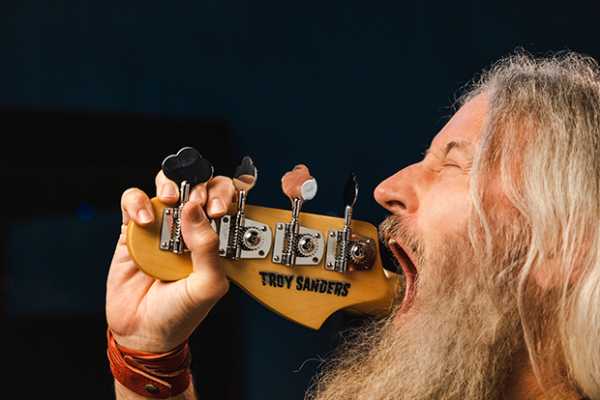
(Fender)
“It’s kind of like writing a record,” he says. “It can take six months or three years, and sometimes it just feels so sluggish. You want to get that thing out there. You want to be done with it. You want to have completion. But it’s always worth it in the end because once it’s out there, whether it’s music, a piece of art, a bass guitar, or whatever, it lives forever, so you need to be very happy with it.”
And Troy is very happy with it. He will play the P-Bass on the upcoming tour with Gojira and Lorna Shore — “I’ll be rocking the P-Bass for sure,” he says. “It would be odd if you were putting out a new artist signature series of anything, whether it be a snare drum, a cymbal, or a guitar, and not play it live. The P-Bass wasn’t created to be studio-only or anything of that nature, so I’m very, very excited about having it on stage with me. It’s my new little buddy.
Troy will also be happy when others play it, both on tour and when they head to West End Sound in Atlanta. Mastodon has part ownership in the recording facility, and Troy tells HL that the studio was another reason he wanted to have his own Fender P-Bass.
“I’ve played them in many, many studios around the country,” he says, “When you walk into a recording facility that’s done some great records and has a really rich history, there’s always a ’70s P-Bass in the guitar boat at your disposal. I’ve walked into places like that with my own gear. You sit down, and you try some things out, and the engineer or producer at some point almost always says, ‘You know what? Play this guy.’ And it always translates to tape/digital better than what I had in my own arsenal.”
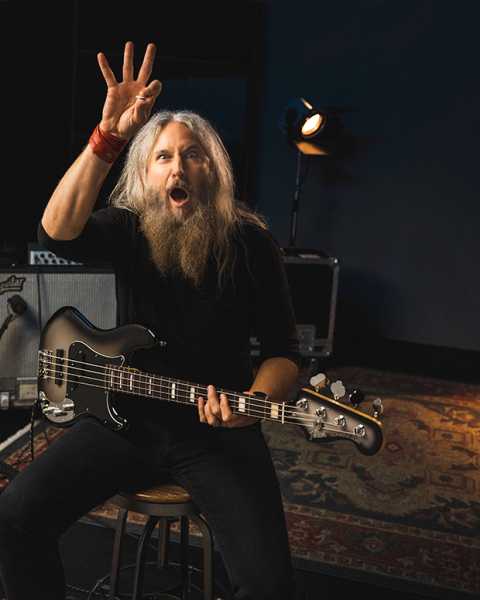
(Fender)
“A part of me wanted to replicate something like that because I always wanted to own a ’70s P-Bass, but for many, many years, every time I’d find one in a shop, they’re three, four, five, six grand, and I just couldn’t do that,” he says. “So I kind of wanted to mimic something similar to a throwback, like a ’70s P-Bass.”
With West End Sound taking off, Troy knew there was one guitar he wanted for the studio’s arsenal for when other artists come in to lay down some tracks. Until this launch, WES didn’t “offer a P-Bass for people that come in to record,” he says, “and I want my bass to be in there for other people to play.” And now, he can.
The Fender® Troy Sanders Precision Bass® continues a relationship that started thirty years ago. “The Fender Prophecy I purchased, they made a short run of them in ’92, ’93, and I just went into a music store one day with 300 bucks on me and just bought it randomly,” says Troy. “So, the relationship with Fender, it just started with spontaneity.”
Though Troy owns “a handful of other” basses, he says he’s “never felt the need or the desire to really go date other companies.” Everything Fender has made “stood the test of time,” he adds. “And there’s a reason that a ’70s Fender P-Bass is in almost every studio around the world. It feels good, plays good, and looks good. I don’t see any other reason to put all that aside and go seek out anything else.”
See out Troy with his Fender® Troy Sanders Precision Bass® when Mastodon comes to your town this year. Click here for details.
Click to Subscribe to Get Our Free HollywoodLife Daily Newsletter to get the hottest celeb news.
Sourse: hollywoodlife.com







